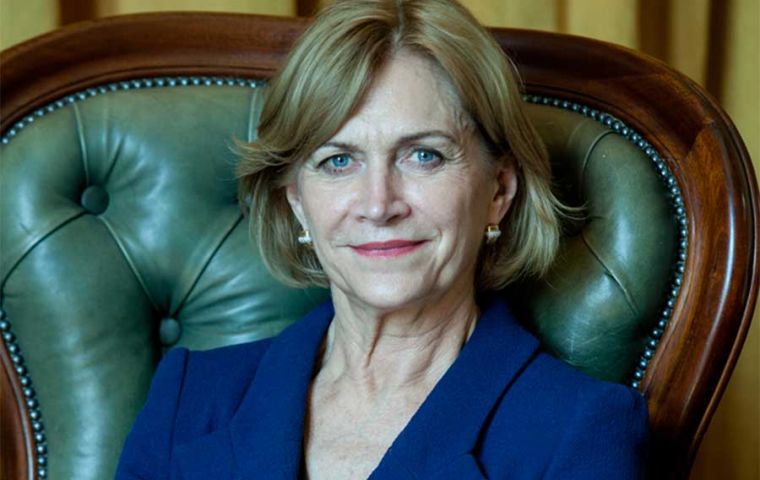MercoPress. South Atlantic News Agency
The woman who will lead Chile’s counter-revolution, according to The Economist
 Evelyn Matthei, currently mayor of a posh Santiago suburb comfortably leads opinion polls for November 2025 presidential election
Evelyn Matthei, currently mayor of a posh Santiago suburb comfortably leads opinion polls for November 2025 presidential election  President Boric has stuffed government agencies with anti-capitalist ideologues who slow-walk everything.
President Boric has stuffed government agencies with anti-capitalist ideologues who slow-walk everything. The graffiti are still visible. Walls shout: “Death to the police!” Bus shelters demand: “No more private pensions!” Yet the occasionally violent social upheaval that rocked Chile from 2019 to 2022 is past. And the radical left-wing movement it propelled to power is now unpopular, having discovered that governing is harder than protesting.
Chileans are fed up with extremism and yearn for moderation and common sense, argues Evelyn Matthei, the mayor of Providencia, a posh part of Santiago, the capital.
Polls suggest that in the election next year, voters will replace Gabriel Boric, a leftist firebrand who cannot seek re-election, with a bastion of the right. Many expected that to be José Antonio Kast, an ultraconservative who scooped up 44% of the vote when he came second to Mr Boric last time. Instead the more centrist Ms Matthei has emerged as the front-runner.
The contrast between Mr Boric and Ms Matthei is striking. He sports ornate tattoos and made his name as a student leader. He was elected in 2021, at only 35, following large protests against inequality. As president, he has proved less radical than the movement from which he sprang. And he deserves credit for his full-throated condemnation of the electoral fraud in Venezuela, a test most leftists in the region have failed. But he backed a utopian and barely intelligible draft constitution, which would have defined Chile as a “pluri-national, inter-cultural, regional and ecological” state, banned for-profit universities and granted rights to nature. Voters roundly rejected the draft in 2022, and shot down another effort from hard line conservatives.
Ms Matthei, a former labor minister, is nearly twice Mr Boric’s age, dresses conservatively and talks about productivity and public order. This goes down well in a country where growth has stagnated and the homicide rate hit a record of 6.7 per 100,000 people in 2022, nearly double what it was a decade ago.
Murders are rare by Latin American standards, and have fallen since 2022, but Chileans are scared. In a poll in November, 51% said tackling crime should be the government’s priority. Only 6% said inequality should be. A recent poll has Ms Matthei handily beating possible opponents on the centre-left: she bests the interior minister, Carolina Tohá, by 61% to 26%, and a former president, Michelle Bachelet (a childhood friend to whom she lost the presidential race in 2013), by 54% to 38%. Ms Matthei also thumps her main opponent on the right, Mr Kast, by 61% to 21%.
Mr Boric has promised to get tougher on crime. But many Chileans still associate him with the excesses of the protest movement, and Ms Matthei is keen to encourage this. “The left wanted to weaken the police, almost to get rid of them,” she told The Economist in an interview in her office.
Some 70% of Chileans think a surge in immigration has made crime worse. “We’ve let in all these foreigners and they steal and steal and you have to look around you all the time,” says Lucy García, an off-duty cleaner, clutching her bag to her chest in a shopping centre in Santiago.
The vast majority of immigrants are law-abiding, notes Andrés Velasco, a former finance minister. But their numbers have risen dramatically: the foreign-born share of Chile’s population of 20m jumped from 1% in 2006 to almost 9% in 2022. The recent influx included gangs from Venezuela, where the economy has collapsed under a leftist dictatorship. “Chile never really had gangs before,” says Mr Velasco. “Now we have them settling scores with machineguns.”
Asked about crime, Ms Matthei talks of prevention: “When a kid stops going to school at 14, he [may be] engaging with drug dealers. Nothing’s being done about that.” She says “nothing is being done” about criminals showing off their loot on Instagram, either. The state should know which judges and prison guards are living beyond their means, she says, and should block phone signals in jails to stop gang bosses running rackets from their cells.
She stresses that most immigrants come to Chile to work. But the gangs have brought kidnapping and contract killing, she says, and are well organized. She recalls a gang of 75 Venezuelans in her area who snatched phones and escaped on motorbikes. When one was caught, police would find that his motorbike had been rented to him by another Venezuelan, who would deny any knowledge of the crime. “They were all part of the game,” she says.
She grumbles that there are perhaps 200,000-300,000 illegal migrants in Chile, largely Venezuelans. Many pass through Bolivia and simply walk across the long land border. Ms Matthei wants aerial drones at the frontier and stricter enforcement. Some migrants, she says, “you will have to send back”.
She is serious about adapting to climate change, stressing Chile’s need for “water, water, water”. The country is the most water-stressed in the Americas. Ms Matthei reels off a list of sensible proposals: better collecting of rainfall, reuse of wastewater and more permits for desalination plants.
Some of the protesters’ complaints during the social unrest were reasonable, Ms Matthei concedes. Many Chileans were “very angry” because they felt economically precarious. “They knew that if they lost their job, or had a serious illness, or grew old, they could go back to being poor.”
Asked to explain how she differs from Mr Kast, she says that she cares about inequality and believes in compromise. Income per head in Chile is over seven times what it was in 1990. That success, Ms Matthei argues, was based on a political consensus that fostered stability. Her play for the centre ground appeals to Chileans who, at the previous presidential election, faced a choice between the far left and the hard right.
Her biggest challenge, should she win the top job, will be boosting growth, which has slowed from about 5% in the decade up to 2013 to less than 2% since. An economist by training, Ms Matthei says she would curb spending to control public debt, rely on growth rather than higher taxes to bolster government revenues, and cut red tape for big projects.
The first prescription is sensible, if not urgent. Public debt has risen to about 40% of gdp today. But that remains one of the lowest rates in the region. Chile needs investment in infrastructure, but she argues that much of it should be done with private-sector concessions. Streamlining permits would help a lot: businesses grumble that Mr Boric has stuffed government agencies with anti-capitalist ideologues who slow-walk everything. But challenges loom. Chile’s growth is still closely linked to the price of copper, which accounts for about half of exports. Agriculture, another big export, faces disruption from climate change. Farmers may have to move south.
Ms Matthei says she is optimistic about the future, with one big caveat. Chile’s education system is failing, and as a former math teacher she feels this acutely. Test results are “embarrassing”; the difference between rich children and poor ones is “scandalous”. The state needs to do more at very early ages, she says. “Of course it is expensive, but we should set national goals and this should not be political.”
She has not yet formally announced she is running, but there seems little doubt that she will. “If things go well, I will run,” she says. “She’s very intelligent and energetic,” says a politician who has worked with her. “On the downside, she has difficulty controlling her temper, and is a bit of a free-market zealot. But overall I think highly of her. She’s much better than Kast, who’s a cross between [Donald] Trump and [Nigel] Farage.”




Top Comments
Disclaimer & comment rulesCommenting for this story is now closed.
If you have a Facebook account, become a fan and comment on our Facebook Page!